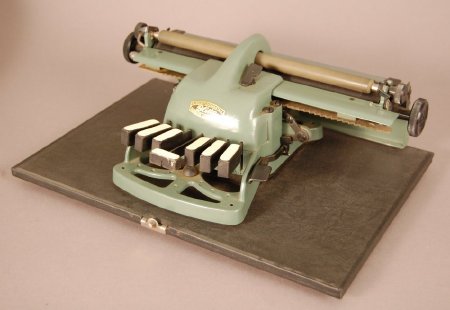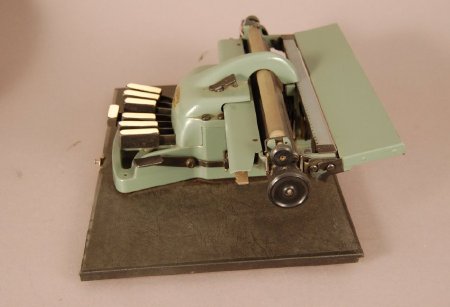Object ID:
1990.8.1-2
Title:
Marburg Braille Writer
Description:
The Blista includes a back space lever, a carriage release lever, and right and left margin stops; keyboard has six keys and space bar; writer and the case weigh 14 pounds; wooden platen roller; finished with grey-green enamel; black wooden keys with cream colored enamel tops; black and gold transfer label, "Blindenstudienanstalt Blista Marburg-Lahn-Germany"; "Blista Marburg-Lahn-Germany" is stamped in metal; serial# 5902; wooden case is covered with paper on the interior; black fabric on the exterior; metal handle with a black gloss enamel; steel latch and angled top; key in case; serial #5902.
.1 - braillewriter
.2 - case
.1 - braillewriter
.2 - case
Date:
ca. 1966
Made by:
Deutsche Blindenstudienanstalt (Blista)
Place of Origin:
Marburg, Germany
Provenance:
APH bought 100 unassembled Marburg Braille Writers in 1950 and sold them for $57.00 as an experiment. This machine was essentially an up-to-date version of the Picht writer. It accommodated sheets of paper up to 11 inches with a maximum of 41 cells per line.
The German Blind Study Institute (Blista) was founded by Dr. Carl Strehl (1886-1971) in 1916 in the historic university town of Marburg to help treat and rehabilitate blinded soldiers. The institute operated a workshop to produce special tools from its inception. The production of braillewriters based on Oskar Picht's original design moved to the Blista factory after WWII.
The German Blind Study Institute (Blista) was founded by Dr. Carl Strehl (1886-1971) in 1916 in the historic university town of Marburg to help treat and rehabilitate blinded soldiers. The institute operated a workshop to produce special tools from its inception. The production of braillewriters based on Oskar Picht's original design moved to the Blista factory after WWII.
Credit Line:
APH Collection, 1990.8

